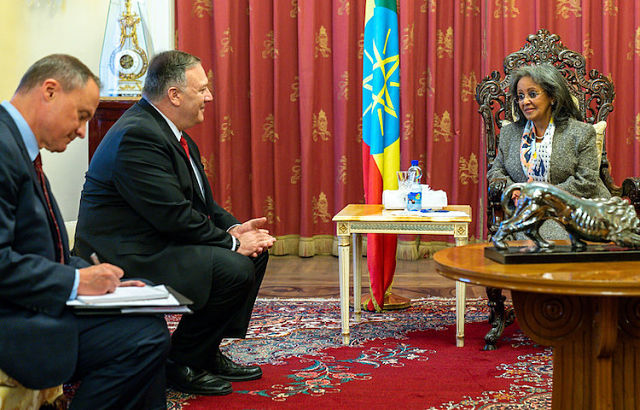 U.S. Secretary of State Michael R. Pompeo meets with Ethiopian President Sahle-Work Zewde in Addis Ababa on February 18, 2020. (State Department Photo)
U.S. Secretary of State Michael R. Pompeo meets with Ethiopian President Sahle-Work Zewde in Addis Ababa on February 18, 2020. (State Department Photo)
IDN
Updated: September 14th, 2020
NEW YORK (IDN) – Based on guidance from President Trump, the State Department is suspending $130 million in security-related aid to Ethiopia over a nearly-completed dam that would lift Ethiopia from poverty and end the shadow of British colonialism that favoured Egypt.
Programs on the chopping block include security assistance, counterterrorism and military education and training, anti-human trafficking programs, and broader development assistance funding, congressional aides said. The cuts would not impact U.S. funding for emergency humanitarian relief, food assistance, or health programs aimed at addressing COVID-19 and HIV/AIDS, they said.
When fully completed, the Grand Ethiopian Renaissance Dam – Africa’s largest hydroelectric project – would be a game-changer for Ethiopia where some 65 million Ethiopians, comprising 40-45% of the population, have no access to electricity. Plus, it would contribute to transforming neighbouring South Sudan, Kenya, Sudan, Somalia and Tanzania with desperately needed electrical power.
The U.S. move has sparked outrage over its apparent interference in Ethiopia’s development strategy. “This action … is more than an outrageous encroachment of Ethiopia’s sovereignty,” wrote economic analyst Lawrence Freeman. “It is an assault on the right of emerging nations to take actions to improve the living conditions of their people.”
Egypt insists that a 1959 Anglo-Egyptian agreement – when both Egypt and Sudan were British colonies – is the legal framework for control of the Nile. That treaty granted Egypt sole veto power over construction projects on the Nile or any of its tributaries which might interfere with Nile waters.
By 2013, Egyptians at a secret meeting were caught on a hot mike proposing to simply destroy the dam altogether.
Officials in Addis Ababa deny that the Renaissance Dam will choke off water to Egypt, saying the dam will benefit countries in the region, including as a source of affordable electric power.
Even the Rev. Jesse Jackson weighed in on the matter. He cited hydro-politics dominated by Egyptian hegemony to control and own the Nile rather than regulate or cooperate.
“The dam was built without help from the World Bank,” he wrote, “but with the pennies and dinars of shoe shiners and poor farmers. They saw the hydroelectric generating juggernaut as a source of Ethiopian independence and pride. Above all, they saw it as the centrepiece of their bid in their fight against poverty.”
Jackson concluded: “All people of conscience and justice around the world need to condemn the neo-colonial treaty that the US government and the World Bank are imposing on Ethiopia, a peaceful nation whose only desire is to harness its natural resources to elevate its people out of poverty.” [IDN-InDepthNews – 14 September 2020]
—
U.S. – ETHIOPIA Relations Take A Wrong Turn: By Ambassador Johnnie Carson
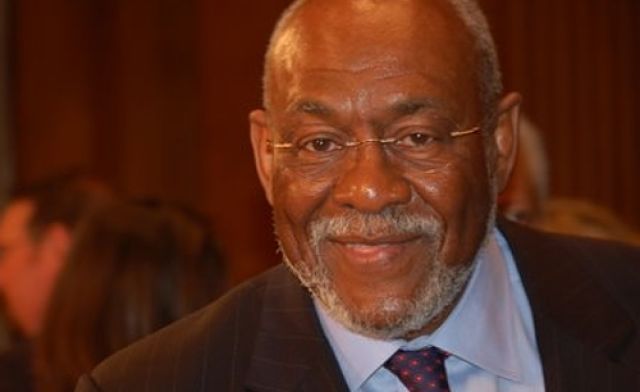
Johnnie Carson, who served as U.S. Assistant Secretary of State for Africa from 2009 to 2012 during the first Obama administration, is a senior adviser at the United States Institute of Peace. A career diplomat, he served as U.S. ambassador to Uganda, Zimbabwe and Kenya. (Photo: AllAfrica)
By Ambassador Johnnie Carson
Updated: September 10th, 2020
The Trump administration’s decision to suspend and delay development assistance to Ethiopia over the filling of the new Grand Renaissance Dam (GERD) is misguided and shortsighted. The move will undermine Washington’s relations and influence in one of Africa’s most significant states.
The decision taken in late August was intended to push Ethiopia into accepting a negotiated solution favored by Egypt. At issue is a timetable for filling the new dam and an agreement on how water from the dam will be allocated to Egypt and Sudan.
Although the announcement to suspend Ethiopia’s assistance was confirmed to reporters by officials at the State Department, the impetus behind this decision came from the Treasury Department, which has managed this issue for the administration, mostly to the total exclusion of the State Department and its Africa Bureau, which is led by a former U.S. ambassador to Ethiopia.
Ethiopia is one of the most widely respected countries in Africa. Headquarters of the African Union, Ethiopia is Africa’s second most populous state, a strong U.S. counterterrorism partner in the Horn of Africa and – in recent years – the fastest growing economy in Africa.
The government unlikely to bow to U.S. pressure over the dam, which enjoys broad support.
Construction of the Grand Renaissance Dam has been a central pillar in the Ethiopian government’s continuing effort to accelerate the country’s economic growth. When completed, the dam is expected to increase Ethiopia’s electrical generation, expand agricultural production and lift millions of Ethiopians out of poverty.
Amid internal regional, religious and political differences, construction of the GERD is one of the few things that all Ethiopians support. For domestic political reasons, the Ethiopian government is likely not to bow quickly or at all to American political pressure on the dam.
The aid suspension is also coming at a very critical moment in Ethiopia’s domestic politics. For the past eighteen months, Ethiopia has been engaged in a sensitive and complicated political transition that could have boosted the country’s potential democratic trajectory. However, national elections that were scheduled for August 2020 were postponed because of the threat of Covid 19, and the evolution of the transition has now been thrown seriously off track by civil unrest, political assassinations and a systematic closing of political space.
As political unrest has increased, Prime Minister Abiy Amed’s popularity has declined and his political control has been challenged. Leaders in Ethiopia’s nine regional states are seriously divided on the shape that Ethiopia’s new democratic transition should take, and Abiy – who won a Nobel Peace prize for ending a long running dispute with Eritrea – is struggling to mend relations between different leaders and ethnic groups in his own country.
The prime minister – once admired country wide – has lost the support of many in his own Oromo community, largely because of the arrest and detention of some the region’s most popular opposition political figures.
Suspension of aid seriously reduces U.S. influence at a time when Ethiopian democracy is threatened
Ethiopia’s political transition and long-term stability are under threat, and the United States should be focused on Ethiopia’s cascading domestic and economic problems, not on leveraging assistance to push Ethiopia into supporting Egypt’s position on the GERD.
The potential for serious unrest and civil war could increase in coming days. Elections are taking place in Tigray province this week, in spite of a central government ban. Tigray, the home of Ethiopia’s once-dominant leadership class, has been operating independently and in open defiance of Prime Minister Abiy for the past two years.
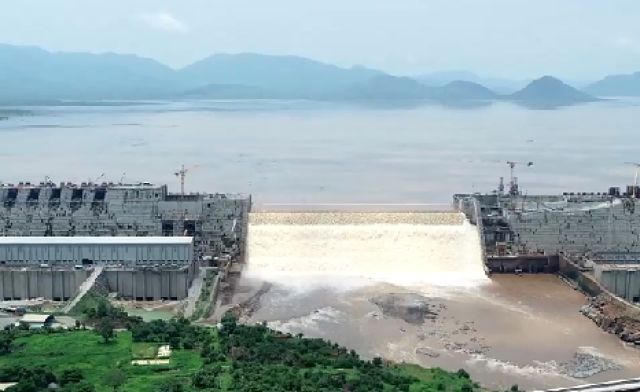
The Grand Ethiopian Renaissance Dam (Gerd), under construction since 2011, began holding back water after the the Blue Nile swelled during heavy rains in July. (Photo: ENA)
U.S. efforts should be focused on keeping Ethiopia from descending into a long period of authoritarian rule, intrastate conflict and instability.
More broadly, the Trump administration’s actions threaten to generate problems across the region. The suspension of aid and a downturn in relations could open the door wider for China and others to expand their influence in Addis and increase the government’s current authoritarian tendencies.
Washington’s actions could also embolden domestic opposition groups to take a more belligerent stand against the Abiy government, resulting in an upsurge in fighting in Ethiopia and a large outflow of refugees into neighboring states.
If Ethiopia becomes distracted by internal conflict, al Shabaab terrorists in neighboring Somalia could expand their activities in Ethiopia’s large Somali region. And Eritrea, which has a history of regional conflict and covert interventionism, could take advantage of the situation to destabilize Ethiopia and increase its regional influence.
Ethiopia’s democratic transition is now stalled, and what happens over the coming months could determine whether it falters and fails. Having suspended development assistance and angered the Ethiopian leadership, the ability of the U.S. to engage on Ethiopia’s democratic, human rights and domestic security issues has been diminished.
Thoughtful action is required now. The United States needs to act fast to salvage its relationship with Ethiopia and find a way to stop the downward spiral in Ethiopia’s increasingly fissiparous and fractious domestic politics.
It needs to turn over responsibility for handling Ethiopian issues to the State Department, where experienced Africanists and regional experts can provide more informed policy guidance on how to move forward and manage Ethiopia ties. It needs to prioritize support for Ethiopia’s political transition – hopefully towards greater democracy – above resolution of the GERD issue.
Regional concerns about equitable use of the Nile waters, while important, will be of minor relevance if Ethiopia becomes engulfed in civil strife and begins to fracture like Yugoslavia did in the 1970s.
Build back relations by boosting diplomatic outreach and increasing assistance
Among the steps that should be taken is to keep the current ambassador in his post for another year. Michael Raynor is a skilled diplomat who knows Ethiopia and its current leadership. This is not the time to change leadership in the Addis embassy.
Also, the administration should dispatch Assistant Secretary of African Affairs Tibor Nagy to discuss U.S.-Ethiopia relations and the GERD issue and seek a face-saving way to pull back the suspension of development assistance. To help put bilateral relations back on track, there needs to be an increase in U.S. assistance to support democratic political change and for development programs and for boosting commercial interactions.
Finally, Washington should work with its European and African partners to build a “Friends of Ethiopia” coalition to strengthen diplomatic dialogue and coordinate greater assistance to one of Africa’s most important states.
The Ethiopians may not say it bluntly or loudly, but the suspension of assistance has tarnished relations with Washington. By acting wisely and skillfully, the U.S. can probably still prevent the damage from being deeper and more enduring.
—
Related:
Jesse Jackson Calls on Congress to ‘Restore Funding for Ethiopia’ and to ‘Investigate’ the Trump Administration
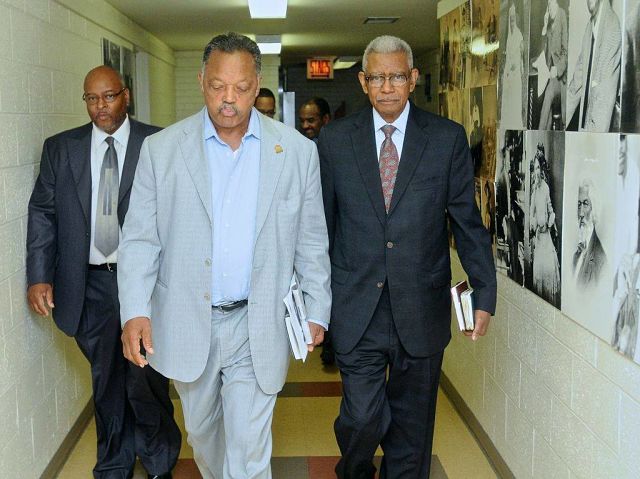
Civil rights leader Rev. Jesse Jackson is urging U.S. Congress: “to fully restore the funding for Ethiopia; and to investigate and demand information regarding the justification for halting aid to Ethiopia from both the State Department and Treasury Department.” (Photo: Rev. Jesse Jackson/Facebook page)
Tadias Magazine
By Taias Staff
Updated: September 4th, 2020
New York (TADIAS) — Civil rights leader Rev. Jesse Jackson is calling for Congress to reinstate the recently suspended U.S. foreign assistance to Ethiopia and to investigate the Trump administration for linking the surprising decision to the Grand Ethiopian Renaissance Dam.
Jackson made the appeal Thursday in a press release shared by his organization Rainbow/PUSH Coalition.
Jackson said he urges the “US Congress to fully restore the funding for Ethiopia; and to investigate and demand information regarding the justification for halting aid to Ethiopia from both the State Department and Treasury Department.”
The Trump administration confirmed this week that it has cut aid to Ethiopia over GERD. According to the Associated Press “it was an unusual example of Trump’s direct intervention on an issue in Africa, a continent he hasn’t visited as president and rarely mentions publicly.”
AP added: “On the guidance of President Trump, the State Department said Wednesday that the United States was suspending some aid to Ethiopia over the “lack of progress” in the country’s talks with Egypt and Sudan over a disputed dam project it is completing on the Nile River…A State Department spokesperson told The Associated Press the decision to “temporarily pause” some aid to a key regional security ally “reflects our concern about Ethiopia’s unilateral decision to begin to fill the dam before an agreement and all necessary dam safety measures were in place.”
In his press release Jackson said: “This is unfortunate and unjust, and the U.S. Congress must intervene, investigate and fully restore aid to Ethiopia.”
Below is the full press release courtesy of the Rainbow/PUSH Coalition:
REV. JESSE L. JACKSON, SR. CONDEMNED THE APPROVED PLAN TO STOP US FOREIGN AID TO ETHIOPIA AND CALLED ON CONGRESS TO INTERVENE.
September 3rd, 2020 | Release
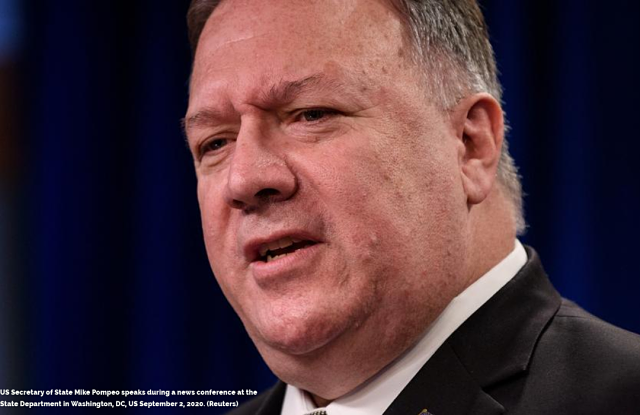
FOR IMMEDIATE RELEASE
Thursday, September 3, 2020
Rev. Jesse L. Jackson, Sr. condemned the approved plan to stop US Foreign Aid to Ethiopia and called on Congress to Intervene.
News reports that U.S. Secretary of State Mike Pompeo has approved a plan to stop $100 million in U.S. foreign aid to Ethiopia, because of the country’s ongoing dispute with Egypt and Sudan over the Grand Ethiopia Renaissance Dam (GERD), finally confirmed what we all knew from the beginning, that the U.S. has never been an impartial mediator in this conflict and instead fully supportive of Egypt.
With this action, the Trump administration, under the leadership of Treasury Secretary Steven Mnuchin (not the State Department), has fulfilled the request made last year by President Abdel Fattah el-Sisi of Egypt, in essence, urging President Trump to assist them. This is unfortunate and unjust, and the U.S. Congress must intervene, investigate and fully restore aid to Ethiopia.
Cross boundary water-sharing agreements are thorny issues that are not easily sorted out. It takes good faith and cooperation from all sides to eek out a win-win solution. The conflict between Ethiopia, Egypt and Sudan has been exacerbated by external interventions, especially the U.S. government.
This is a conflict mainly between two founding members of the African Union (AU), Ethiopia and Egypt. The AU has a Peace and Security Council that serves as “the standing decision-making organ of the AU for the prevention, management and resolution of conflicts and is the key pillar of the African Peace and Security Architecture that is the framework for promoting peace, security and stability in Africa.” This U.S. action is aimed at undermining the ongoing negotiations under the leadership of President Cyril Ramaphosa of South Africa and the current AU Chairperson.
To top it off, in a tweet a few months ago, the World Bank President David R. Malpass let it be known that he has spoken “with Ethiopian PM @AbiyAhmedAli on recent @WorldBank financing approvals important to unifying Ethiopia and its neighbor’s ability to sustain constructive dialogue + cooperation on water sharing.” To my knowledge, no statement was issued to tie the World Bank’s financial support to Egypt with its cooperation (or lack thereof) on water sharing with Ethiopia.
Ethiopia is a reliable and very stable democratic ally of the U.S. on many vital fronts and should be treated with respect and dignity.
History will judge the U.S. government and the World Bank’s unjust intervention to deny 110 million Ethiopians an “equitable and reasonable” share of the Nile River for their development needs. This is nothing short of condemning a black African nation and her population to abject and perpetual poverty. No one should condemn Egypt to suffer unduly, considering that 97 percent of its population depends on the Nile River. Justice requires treating both nations and their over 200 million people fairly with justice the result on both sides.
Looking at the World Bank data on electric power consumption (kilowatt per capita) shows how much Ethiopia needs the GERD. In 2014, the most recent year for which World Bank data is available, the average for the world per capita electric power consumption is 3133 kilowatts. The figure for Egypt is 1683. For Ethiopia it is a mere 69 (sixty-nine). A former World Bank Deputy Global Manager, Yonas Biru, wondered how Ethiopia could survive with next to nothing-electric power, in a recent article in Addis Fortune.
His answer was as revealing as it is saddening. “The nation rides on the shoulders and backs of women. From cradle to grave, women carry Ethiopia on their back, literally. Girls are condemned to fetching water from miles away rather than going to school. Their mothers travel just as far and spend just as much time collecting firewood.”
The GERD, Biru said, signifies “the emancipation of Ethiopian women. The interventions by Egypt, the Arab League, the World Bank and the U.S. to delay and scale back the GERD is a setback for women. It is a revocation of the emancipation of Ethiopian girls and women.”
Ethiopia, one of the poorest black African nations, is standing alone against the mighty forces of the U.S. and the World Bank. Befitting of its history, Ethiopia remains unflinching with its indomitable sovereignty and unwavering spirit with its trust in what its people call “Ethiopia’s God.”
The World Bank’s professed dream is “A World Free of Poverty.” It behooves me to ask if Ethiopia, too, is in the Bank’s dream. The World Bank board of directors need to explain to over 50 million girls and women in Ethiopia why the World Bank stands against their economic emancipation.
As to the US government, I call upon the US Congress: (1) to fully restore the funding for Ethiopia; and (2) to investigate and demand information regarding the justification for halting aid to Ethiopia from both the State Department and Treasury Department.
—
Related:
Cutting Aid to Ethiopia Haunts Trump in Election
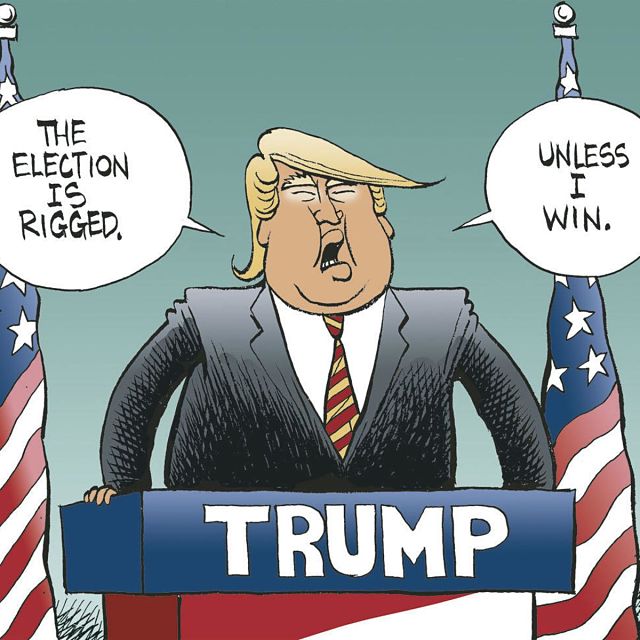
David Shinn, a former US envoy to Ethiopia said playing political hardball with Ethiopia will not only fail to obtain the desired result but will probably ensure that the Ethiopian diaspora in the US will rally against Trump and spoil his chances in the close contest. “There are sizeable Ethiopian-American communities in key states such as Georgia, Texas, and Virginia,” he said. (Image: Tulsa World)
AA
Addis Getachew | ADDIS ABABA, Ethiopia
Updated: September 2nd, 2020
Ethiopian-Americans against US cutting $130M aid to Ethiopia to enforce Egypt friendly agreement on sharing Nile waters
The US has now formally stepped in, to support Egypt and punish Ethiopia over the river water sharing dispute between the two African countries.
Last week, the Trump administration announced blocking a $130 million aid that had been earmarked to support Ethiopia’s defense and anti-terrorism efforts.
Secretary of State Mike Pompeo signed the cut in aid, ostensibly to build pressure on Ethiopia, a rugged landlocked country in the Horn of Africa.
While it is not clear to what extent the US decision will affect Ethiopia, but it has united everyone in the country and the diaspora.
“We have officially requested the US administration that they give us an explanation,” said Ethiopia’s Ambassador to Washington Fitsum Arega, while taking to Twitter.
David Shinn, a former US envoy to Ethiopia said playing political hardball with Ethiopia will not only fail to obtain the desired result but will probably ensure that the Ethiopian diaspora in the US will rally against Trump and spoil his chances in the close contest. “There are sizeable Ethiopian-American communities in key states such as Georgia, Texas, and Virginia,” he said.
Ethiopian government led by Prime Minister Abiy Ahmed had earlier rejected an agreement brokered by the US Treasury Secretary Steven Mnuchin in February related to the filling and operation of the $5billion Grand Ethiopian Renaissance Dam (GERD). Ethiopia said the US proposal was heavily tilted towards Egypt.
Relations between Cairo and Addis Ababa have strained over recent times, over the filling and operation of the dam that has come upon the Blue Nile, one of the tributaries of the River Nile.
Since June, the African Union has been mediating now to evolve a win-win formula between Ethiopia, Sudan, and Egypt.
The AU has entrusted its Bureau of the Assembly of Heads of State and Government including South Africa, Kenya, Mali, and Democratic Republic of Congo (DRC) to prevent any escalation between these countries. The European Union, the World Bank, and the US continue as observers in the group.
—
Related:
Mike Pompeo is the Worst U.S. Secretary of State in History
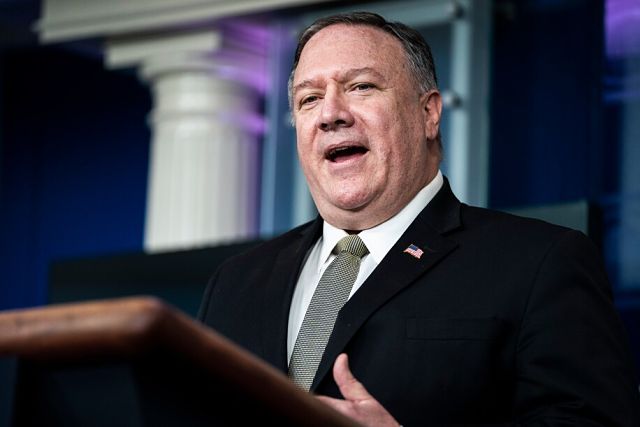
Mike Pompeo’s handing of the Trump administration’s foreign policy “has led to some of the worst diplomatic damage the United States has suffered in decades — especially in relations with its closest allies,” writes The Washington Post’s Deputy editorial page editor and columnist Jackson Diehl. (Photo: The Washington Post)
The Washington Post
Updated: August 30, 2020
As secretary of state, Mike Pompeo has presided over the collapse of negotiations with North Korea, the failure of a pressure campaign against Iran and an abortive attempt to oust Venezuela’s authoritarian regime. On his watch, China has carried out genocide in its Xinjiang region and the suppression of Hong Kong’s freedoms without resistance from Washington until it was too late.
Pompeo has failed to fill dozens of senior positions at the State Department, and hundreds of career diplomats have left or been driven out in political purges. Morale is at a historic low: In staff surveys, there has been a 34 percent increase between 2016 and 2019 in those who say the State Department’s senior leaders “did not maintain high levels of honesty and integrity.” Maybe that’s because Pompeo himself has defied legal mandates from Congress, skirted a law restricting arms sales to Saudi Arabia, tasked staffers with carrying out errands for himself and his wife, and fired the inspector general who was investigating his violations.
Last week, Pompeo crossed yet another ethical line by speaking before the Republican National Convention, thereby disregarding the State Department’s explicit legal guidance against such appearances. The speech he delivered was weak and littered with false or simply ludicrous claims, such as that the recent diplomatic accord between Israel and the United Arab Emirates is “a deal that our grandchildren will read about in their history books.” Maybe if they major in Middle Eastern affairs.
With his ambitions likely fixed on a presidential candidacy in 2024, Pompeo is undoubtedly hoping most of the diplomatic disasters will ultimately be blamed on President Trump, especially if Trump loses the November election. But the former Kansas congressman should not get off so easy. Yes, it’s Trump’s foreign policy. But Pompeo’s steering of it has led to some of the worst diplomatic damage the United States has suffered in decades — especially in relations with its closest allies.
—
Related:
Pompeo approves plans to halt aid to Ethiopia over Nile dam dispute

Getty Images
08/28/20
Secretary of State Mike Pompeo has approved plans to halt some U.S. aid to Ethiopia, Foreign Policy reported on Friday.
The halt in aid comes as the U.S. mediates a dispute over a dam on the Nile River that’s pitted Ethiopia against Egypt and Sudan, according to Foreign Policy. The decision could impact up to $130 million of assistance to programs including security, counter-terrorism and anti-human trafficking.
“There’s still progress being made, we still see a viable path forward here,” a U.S. official told the magazine. “The U.S. role is to do everything it can to help facilitate an agreement between the three countries that balance their interests. At the end of the day it has to be an agreement that works for these three countries.”
The State Department did not immediately respond to a request for comment from The Hill.
Ethiopia and Egypt are at a standstill in negotiations over how the dam on a tributary of the Nile will be managed.
Egypt and Sudan, which depend on the Nile for much of their fresh water, are opposed to any development they say will impact the flow downstream, including the 6,000-megawatt power plant Ethiopia hopes to develop at the dam.
—
Is the Trump Administration Using Aid to Bully Ethiopia Over Nile Dam?
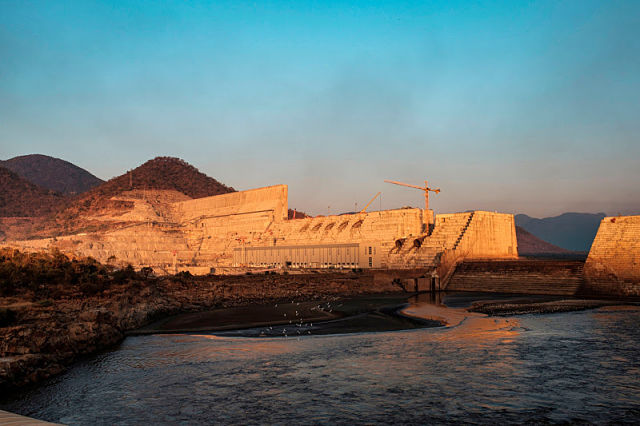
It’s too bad that the U.S. has decided to take the wrong side in a local African dispute regarding the Grand Ethiopian Renaissance Dam. As the following FP article reports the Trump administration is cutting off “some foreign assistance” to Ethiopia over GERD. The scheme may be intended to tip the scale in Egypt’s favor, but if history is any indication this kind of foreign intimidation does not work in Ethiopia. It’s also worth mentioning that the dam, a $4.5 billion hydroelectric project, is being fully funded by the Ethiopian people. (Getty Images)
U.S. Halts Some Foreign Assistance Funding to Ethiopia Over Dam Dispute with Egypt, Sudan, Some U.S. officials fear the move will harm Washington’s relationship with Addis Ababa.
Updated: AUGUST 27, 2020
Secretary of State Mike Pompeo has approved a plan to halt U.S. foreign assistance to Ethiopia as the Trump administration attempts to mediate a dispute with Egypt and Sudan over the East African country’s construction of a massive dam on the Nile River.
The decision, made this week, could affect up to nearly $130 million in U.S. foreign assistance to Ethiopia and fuel new tensions in the relationship between Washington and Addis Ababa as it carries out plans to fill the dam, according to U.S. officials and congressional aides familiar with the matter. Officials cautioned that the details of the cuts are not yet set in stone and the finalized number could amount to less than $130 million.
Programs that are on the chopping block include security assistance, counterterrorism and military education and training, anti-human trafficking programs, and broader development assistance funding, officials and congressional aides said. The cuts would not impact U.S. funding for emergency humanitarian relief, food assistance, or health programs aimed at addressing COVID-19 and HIV/AIDS, officials said.
The move is meant to address the standoff between Ethiopia and other countries that rely on the Nile River downstream that have opposed the construction of the massive dam project, called the Grand Ethiopian Renaissance Dam. Egypt sees the dam’s construction as a core security issue given the country’s heavy reliance on the river for fresh water and agriculture, and in the past Egyptian President Abdel Fattah al-Sisi has hinted his country could use military force to halt the dam’s construction.
Some Ethiopian officials have said they believe the Trump administration is taking Egypt’s side in the dispute. President Donald Trump has shown a fondness for Sisi, reportedly calling him his “favorite dictator” during a G-7 summit last year. Officials familiar with negotiations said the Trump administration has not approved parallel cuts in foreign assistance to Egypt.
Administration officials have repeatedly assured all sides that Washington is an impartial mediator in the negotiations, which mark one of the few diplomatic initiatives in Africa that the president has played a personal and active role in. These officials pointed out that Egypt has accused the United States of taking Ethiopia’s side in the dispute as well.
“There’s still progress being made, we still see a viable path forward here,” said one U.S. official. “The U.S. role is to do everything it can to help facilitate an agreement between the three countries that balance their interests. At the end of the day it has to be an agreement that works for these three countries.”
But the move is likely to face sharp pushback on Capitol Hill, according to Congressional aides familiar with the matter. State Department officials briefed Congressional staff on the decision on Thursday, the aides said, and during the briefing insisted that the U.S.-Ethiopia relationship would remain strong despite a cutback in aid because the United States can have tough conversations “with friends.”
“This is a really fucking illogical way to show a ‘friend’ you really care,” one Congressional aide told Foreign Policy in response.
—
Join the conversation on Twitter and Facebook.

























